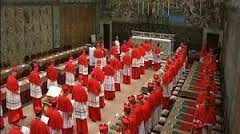Concerning the ‘dubium’ put forward by the four cardinals, asking the Pope to clarify certain ambiguities in the recent post-Synodal Exhortation Amoris Laetitia, we can turn to Canon 212§3. of the 1983 Code of Canon Law, which states that
According to the knowledge, competence, and prestige which they possess, they have the right and even at times the duty to manifest to the sacred pastors their opinion on matters which pertain to the good of the Church and to make their opinion known to the rest of the Christian faithful, without prejudice to the integrity of faith and morals, with reverence toward their pastors, and attentive to common advantage and the dignity of persons.
If even lay people have this ‘right and duty’, one would think that bishops, who have the task of guarding and expounding Revelation as handed on from the Apostles, can also make known to their fellow bishops, including the Pope, ‘their opinion on matters which pertain to the good of the Church’. The decree on Bishops from Vatican II, Christus Dominus, declares
As legitimate successors of the Apostles and members of the episcopal college, bishops should realize that they are bound together and should manifest a concern for all the churches. For by divine institution and the rule of the apostolic office each one together with all the other bishops is responsible for the Church (#6)
Bishops have the right and the duty to be solicitous for the universal Church, for the clarity and purity of her doctrine. There is, therefore, in the Church the long and venerable tradition of submitting dubia to the Apostolic See, wherein pastors may request clarifications on certain points of doctrine, previously ambiguous, or not clarified sufficiently for whatever reason.
Then-Cardinal Ratzinger responded to one such dubium (not that there was much doubt) after Pope John Paul declared that only men could be priests in his 1994 Ordinatio Sacerdotalis. When this was questioned, the Cardinal, as head of the Congregation for the Doctrine of the Faith, responded with a reply that should have ended matters, declaring this doctrine to be infallible.
The cardinal-bishops in this case had the full right to ask for clarification. Of course, the Pope, with ‘full, supreme and universal power’ is also free not to respond to dubia, for reasons which he is also not bound to make public. The only ultimate judge of the Pope is God. Hence, I leave open-ended, for now, whether the four cardinals should have made their own (unanswered) dubia public. I am not sure, for we should strive for a balance between making the truth explicit, and preserving unity in the Church (and I wonder if we even want the explicit truth here). I am just glad I am not a cardinal, whose red robes may mean something more than symbolic soon. We are in strange and unusual times, and perhaps strange and unusual methods are now required.
You may have read reported in the news recently, and described on LifeSite, of a young woman in Kamloops who drowned her new-born baby in the bathtub (she delivered him herself at home, apparently), disposed of his body, then went off to take an exam. The troubled young woman, who was given a two-year probational sentence, since she was deemed ‘no threat to society’, is basically being let off scot-free. She claims the child was a result of a sexual assault while she was passed out inebriated at a party, and that she did not know she was pregnant until recently. All very emotional and sympathetic, but what, yes I ask, what of the drowned baby?
This should surprise no one, for the judge could not but consider that if she had wandered into an abortuary just a few hours before, while the baby was still in utero, she could have had her baby killed, legally, with the full support of the State and medical system, no questions asked, all antiseptic and worry free.
 Yes, the effects of Roe vs. Wade and Morgentaler ripple on through, quite literally ripping apart the moral fabric of our universe. Once you open the Pandora’s box of death, it is difficult to keep it shut, for all sorts of evils come flying out. Peter Singer, the infamous professor of ‘ethics’ at Princeton, has through his vaunted and ballyhooed career advocated for a legal right for parents to euthanize their babies and toddlers for up to two years, at which point, he claims, they (the children, not the parents) become ‘sentient’ and worthy of autonomous rights (which Singer also advocates for chimps and gorillas and other ‘sentient’ animals). That would be more difficult since, unlike ‘infants’ (whose name means ‘unable to speak’), babies and toddlers can cry, kick and scream, or at least look at you with doleful eyes, on their way to the charnelhouse. All a bit more troublesome, one would think, which is likely why Singer’s suggestion has never quite been carried out. But one never knows in our day and age. As troubling as what it implies, Texas’ new law requiring victims of abortion to be given a proper burial at least brings this evil more out into the open, declaring it to be what it really is.
Yes, the effects of Roe vs. Wade and Morgentaler ripple on through, quite literally ripping apart the moral fabric of our universe. Once you open the Pandora’s box of death, it is difficult to keep it shut, for all sorts of evils come flying out. Peter Singer, the infamous professor of ‘ethics’ at Princeton, has through his vaunted and ballyhooed career advocated for a legal right for parents to euthanize their babies and toddlers for up to two years, at which point, he claims, they (the children, not the parents) become ‘sentient’ and worthy of autonomous rights (which Singer also advocates for chimps and gorillas and other ‘sentient’ animals). That would be more difficult since, unlike ‘infants’ (whose name means ‘unable to speak’), babies and toddlers can cry, kick and scream, or at least look at you with doleful eyes, on their way to the charnelhouse. All a bit more troublesome, one would think, which is likely why Singer’s suggestion has never quite been carried out. But one never knows in our day and age. As troubling as what it implies, Texas’ new law requiring victims of abortion to be given a proper burial at least brings this evil more out into the open, declaring it to be what it really is.
Ideas have consequences, and there is a deep metaphysical basis underlying our societal ills, not least our misconstrued notion of ‘rights’, which many curiously think come from a benevolent State, and not, as they do, from God. A baby has a right to life not because the government or parliament says he does, or does not, but rather because he is made ‘unto the image’ of that same God, Who will demand a reckoning for all that is done, and not done, to and for His ‘little ones’.
So expect more such cases like this unfortunate woman and her lost child, whose conscience we hope is not fully at fault, until that reckoning takes place. As we say in Advent, marana tha! Come, Lord Jesus…

